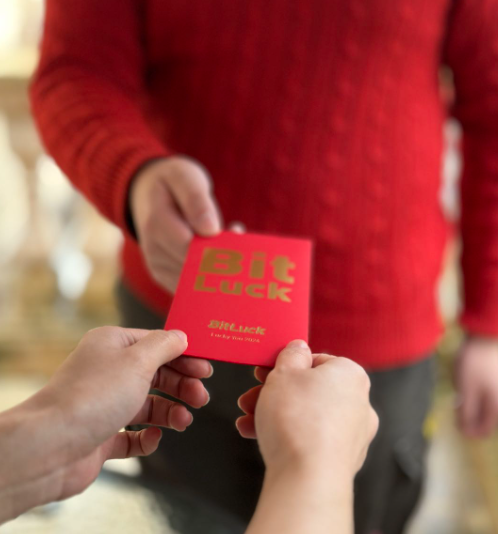From owning Bitcoin, to seeing Bitcoin, to understanding Bitcoin.
Author: Joseph, Freelance Journalist
One
February 10th is the first day of the lunar new year. Starting early in the morning, people visit relatives and friends, exchanging New Year's blessings.
For Filipino elementary school student Miguel, this day was somewhat different: he received a special gift—a Bitcoin red envelope.

Many people, like Miguel, also received Bitcoin red envelopes. What is Bitcoin? Where can Bitcoin be stored? How to download a Bitcoin wallet?—they excitedly asked.
Red envelopes, also known as "red envelope" in Chinese, are an ancient social etiquette that originated in the Han Dynasty of China 2,000 years ago. During the New Year, the younger generation pays New Year's visits to the elders, who in turn give red envelopes containing cash. Giving and receiving red envelopes symbolizes the transmission of blessings and the start of good luck.
Friends can also exchange red envelopes. Widely known in this regard is the red envelope function in WeChat, China's largest social app: it allows users to send electronic red envelopes to others, or send a certain amount to a chat group for others to "grab the red envelope." This feature has been well-received since its launch; statistics show that on the eve of 2024 alone, 190 million WeChat red envelopes were sent out. This is just a part of it: including East Asia and Southeast Asian countries, a total of 2 billion people worldwide have the custom of giving and receiving red envelopes.
There's nothing more joyful than receiving a red envelope. And receiving a Bitcoin red envelope during the Spring Festival is not only auspicious, but also holds extraordinary significance for many people.

Riding on the festive atmosphere, Bitcoin surged past $50,000 on the first day of the lunar new year. Coupled with the approval of an ETF a month earlier, the entire Bitcoin community was in high spirits, sparking tens of thousands of discussions about Bitcoin on social media.
Giving Bitcoin in red envelopes to elders and friends has become the perfect New Year's gift this Spring Festival. Friends who haven't seen each other for a long time can finally put down their work during the Spring Festival, have tea, chat, and exchange their lives and New Year plans. This year, because of a red envelope, the familiar yet unfamiliar thing—Bitcoin—has been added to their conversations.
Two
At the same time, in the slums of Lagos, the capital of Nigeria, women and children are receiving Bitcoin red envelopes from NGO workers. Along with the red envelopes are over 200 servings of nutritious meals, helping them combat food shortages caused by flooding.

In recent years, many people in developing countries have begun to use Bitcoin as a means to solve real-world problems. Some young people working abroad with cross-border remittance needs have started using Bitcoin to remit money back home, a process that takes only a few minutes and a few dollars. In addition, in areas with persistent inflation, many people have chosen Bitcoin to protect their assets from devaluation. And in countries with a large population without bank accounts, people are gradually starting to choose electronic currency that can be transferred with just a mobile phone.
A red envelope carrying blessings and good luck has allowed them to see another option from owning Bitcoin. The seeds of Bitcoin are quietly taking root in these regions.
"For Make Bitcoin Popular, this is a good start," said Old Wang, founder of 3WW3 Asia-Africa Research Institute. 3WW3 is a global community dedicated to promoting and popularizing Web3 in emerging countries; they are one of the initiators of the red envelope transmission activity and are actively exploring the construction and application of the Bitcoin ecosystem.
Three
Some believe that 2024 is destined to belong to Bitcoin. From the eruption of the mining race, to the approval of Bitcoin spot ETFs, to Bitcoin's price breaking through $60,000, the Bitcoin ecosystem has become the focus of the entire cryptocurrency community. The influx of capital and talent is accelerating the pace of innovation, with emerging protocols such as BRC-20, Atomicals, the potential of L2 and various ecological applications, exploring the infinite possibilities on the strongest consensus network in Web3.
Bitcoin is unforgeable, with a constant quantity, no inflation, and past transaction records that cannot be tampered with. In an environment without a central server, it has been running stably for 15 years. These revolutionary features have attracted a large number of believers since the birth of Bitcoin. They are called Bitcoiners, dedicated to building communities and promoting the importance of Bitcoin and blockchain technology.
Over the past fifteen years, Bitcoiners' efforts to push Bitcoin into the mainstream have never stopped:
In 2015, Luxembourg programmer Felix Weis embarked on a year-long global journey, using only Bitcoin to pay for all expenses;
In 2019, Paris-based artist Pascal Boyart hid Bitcoin donation QR codes in street murals, allowing viewers to directly support his work with Bitcoin;
In 2023, Tanzanian professional teacher and musician Man Like Kweks climbed Mount Kilimanjaro to attract public attention and raise funds for his Bitcoin education project, POWA.
Bitcoin needs to be recognized, accepted, and used by more people, not just a few.
On January 11, 2024, the U.S. SEC approved 11 Bitcoin spot ETFs, marking an important milestone for Bitcoin's mainstream adoption;
And a month later, during the Lunar New Year, the most lively festival in the East, this set a wonderful stage for Bitcoin to break free from its limitations.
"The red envelope custom has 2 billion cultural consensuses worldwide, and Bitcoin has nearly 50 million holders globally. The combination of the two is the integration of technology and humanities, tradition and modernity, and national and global. When a huge cultural consensus collides with a huge encrypted consensus, Bitcoin will be seen and accepted by more people," said Old Wang.
From owning Bitcoin, to seeing Bitcoin, to understanding Bitcoin. The Bitcoin red envelope born from the consensus fusion has allowed Bitcoin to make an attempt to break free this Lunar New Year.
Four
Satoshi Nakamoto once said, "In 20 years, Bitcoin will either be massively used or will be forgotten." With the continuous efforts of a group of libertarians in the Internet world, Bitcoin has evolved from a niche hobby of cypherpunks to the biggest consensus in the cryptocurrency industry. Although Satoshi Nakamoto's vision of Bitcoin being massively used is still far off, numerous Bitcoin believers are pushing forward, driving it into a broader perspective.
It can be expected that when tens of millions of Bitcoin holders transform into tens of millions of Bitcoin builders, it will bring unprecedented energy to the Bitcoin ecosystem, truly propelling Bitcoin into popularity. The Bitcoin ecosystem will also witness more financial innovations, ushering in a new era of centralized financial applications and ecosystems based on Bitcoin. The more innovations and efforts emerge in the Bitcoin ecosystem, the closer we will get to mass adoption.
免责声明:本文章仅代表作者个人观点,不代表本平台的立场和观点。本文章仅供信息分享,不构成对任何人的任何投资建议。用户与作者之间的任何争议,与本平台无关。如网页中刊载的文章或图片涉及侵权,请提供相关的权利证明和身份证明发送邮件到support@aicoin.com,本平台相关工作人员将会进行核查。



